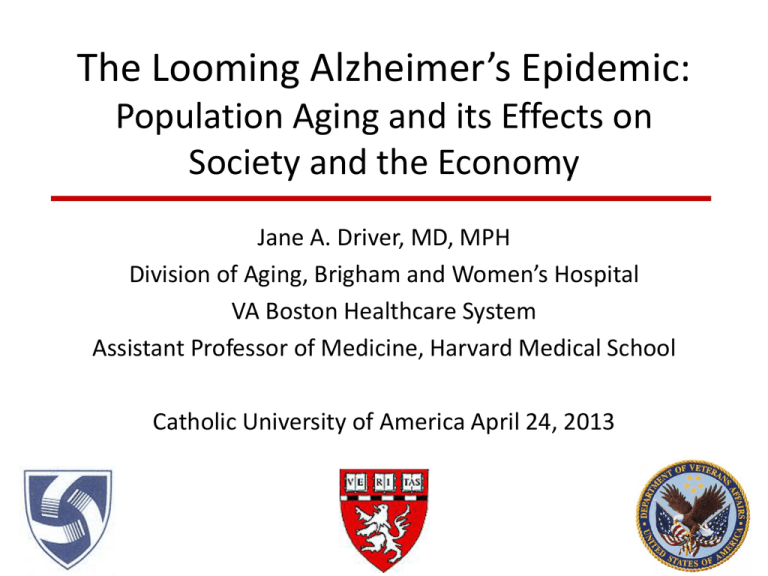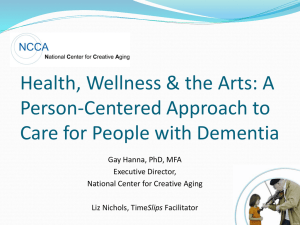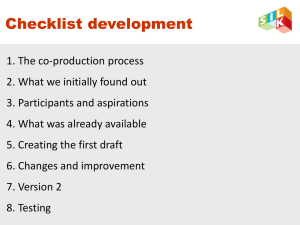Margaret Sanger (1879-1966) - Integral Economic Development
advertisement

The Looming Alzheimer’s Epidemic: Population Aging and its Effects on Society and the Economy Jane A. Driver, MD, MPH Division of Aging, Brigham and Women’s Hospital VA Boston Healthcare System Assistant Professor of Medicine, Harvard Medical School Catholic University of America April 24, 2013 The Looming Alzheimer’s Epidemic: Population Aging and its Effects on Society and the Economy Jane A. Driver, MD, MPH Geriatric Research Education and Clinical Center, VA Boston Healthcare System Division of Aging, Brigham and Women’s Hospital Assistant Professor, Harvard Medical School A Passage to India “Each human soul is worth more than the entire material universe.” -Thomas Aquinas. What is Dementia? • Chronic progressive disease of the brain – Global deterioration in intellect, including memory, learning, orientation, language, comprehension, judgment and comportment • Most common causes – Alzheimer’s Disease – Vascular dementia Stages of Alzheimer’s Disease • • • • • • • Stage 1: No impairment Stage 2: Very mild cognitive decline Stage 3: Mild cognitive decline (MCI) Stage 4: Moderate decline (Early AD- IADLs) Stage 5: Moderately severe (Moderate AD- ADLs) Stage 6: Severe decline (complete dependence) Stage 7: Very severe decline (nonverbal) Grace • http://www.youtube.com/watch?v=7wbYEK7 O14E Types of Care for People with Dementia • Informal care – Unpaid care provided by family and others • Social care – Community care professionals, nursing home • Medical care – Outpatient visits, medications, hospitalizations Voxel-wise comparison to amyloid negative group Treatment Trials- 2012 • Bapinezumab- negative trials • Solanezumab – 2 large phase III trials were negative – When results were combined, cognitive decline was slowed by 34% in those with the mildest symptoms – First evidence that a drug targeting B-amyloid might be useful for prevention AD Prevention Trials Starting in 2013 Trial Name Patient Population Drug Being Tested A4 Trial- AD Cooperative Study 1000 patients aged 70-85 with positive florbetapir scans Solanezumab B-secretase inhibitor Alzheimer’s Prevention Initiative (API) Presenilin mutation carriers in Columbia ApoE4 homozygotes 60-80 years old Crenezumab Dominantly Inherited Alzheimer’s Network (DIAN) Asymptomatic gene carriers Young Gantenerumab Solanezumab B-secretase inhibitor Epidemiology of Dementia in the US • • • • • • • 5.4 million Americans have AD; will triple by 2050 65 and older: 1 in 8; 85 and older: 1 in 2 2/3 of people with dementia are women Average life expectancy after AD diagnosis: 8y Annual cost of dementia care in 2011: 183 billion Estimated annual cost by 2050: 1.1 trillion Medicare spending on dementia will increase by 600% by 2050 Alzheimer’s Disease Facts and Figures, 2011. www.alz.org Mortality Rates for Common Diseases in the United States Source: Alzheimer’s Association Facts and Figures 2011 Report Global Economic Impact of Dementia • 0.5% of the world’s population has dementia • Total worldwide estimated costs $604 billion in 2010 – 70% of costs occur in Western Europe and North America – 1% of the world’s gross domestic product • By 2030 costs projected to increase by 85% World Alzheimer’s Report 2010: The Global Economic Impact of Dementia World Alzheimer’s Report 2010: The Global Economic Impact of Dementia World Alzheimer’s Report 2010: The Global Economic Impact of Dementia Future Projections • Currently only 6% of people with dementia in low or middle income countries live in NHs • Set to expand rapidly due to – Increase in wages as countries develop – Rapid societal aging – Demographic and social changes that reduce availability of informal caregivers – Per-person costs of dementia care will increase Alzheimer’s Disease International, 2009. www.alz.co.uk Speed of Population Aging Number of years for % of population aged 65 and over to rise from 7% to 14% Colombia Brazil Thailand Tunisia Sri Lanka Jamaica Chile Singapore China Azerbaijan Japan Spain United Poland Hungary Canada United Australia Sweden France 20 21 22 23 23 24 25 27 27 41 26 Source: US Census Bureau, 2000 45 45 47 53 65 69 73 85 115 Urgent Need for Action • Government must make dementia a health care priority and develop a plan to provide and finance dementia care • Need to re-design health care systems to deal with chronic, age-related diseases • Increase funding for research and prevention – Currently about 10% of that spent on cancer research • Adequate support for family caregivers and care of vulnerable elderly Dementia Awareness China Dominican Republic Peru Sri Lanka Margaret Sanger • "The most merciful thing that a large family does to one of its infant members is to kill it." Women and the New Race • "More children from the fit, less from the unfit -that is the chief aim of birth control." Birth Control Review, May 1919, Margaret Sanger (1879-1966) Margaret Sanger • • • • Committed neo-Malthusian Overpopulation is the world’s biggest problem Contraception is the solution People who are unfit should not procreate – The poor, physically disabled, mentally disabled • “Quality not quantity” • New world order: birth control, population control, eugenic control • Eugenic control + sexual libertinism The Enemy: Female Fertility “Possible drastic and Spartan methods may be forced upon society if it continues complacently to encourage the chance and chaotic breeding that has resulted from our stupidly cruel sentimentalism.” Forced sterilization legalized by the U.S. supreme court in 1927 in Buck v. Bell. Margaret Sanger, The Eugenic Value of Birth Control Propaganda, Birth Control Review, October 1921. Expenditure on Grant-Financed Development Activities of the United Nations System by Sector 20 15 10 5 19 91 19 92 19 93 19 94 19 95 19 96 19 97 19 98 19 99 20 00 20 01 20 02 20 03 20 04 0 19 90 Percentage of Total 25 Year Population T ransport Science and T echnology Energy Communications Employment Industry T rade and Development Dark Days in India • 1975-1977 Indira Gandhi suspended democracy for 21 months • Her son Sanjay organized a nationwide compulsory sterilization campaign • Mandated vasectomies or tubal ligations in families of 2 or more children • Widespread fear and resistance • Thousands were forcibly sterilized Continued Coercion • Forced sterilization is now recognized as a crime against humanity • In 2004, Uttar Pradesh’s population policy called for 930,000 sterilizations, paid for by $360m from USAid. • Shift from force to coercion • Guns for sterilization – Shotgun=2 sterilizations – Revolver=5 sterilizations Randeep Ramesh, The Guardian, November 2004 Anti-U.S. mob attacks Hillary Clinton's convoy armed with eggs, paintballs and rocks in the Philippines. November 17, 2011 Human Population Growth Population Growth 1775–2000 Japan’s Age Pyramid Population Implosion • A smaller younger population has to support a growing number of elderly people • By 2035 even China will have a reversed age pyramid • From 2000 to 2025, people above 65 will triple while those under 15 will increase by only 6% China’s One Child Policy • Has prevented more people than the US population • Population will peak at 1.5 B at • Within 15 years it will be short of 30 million brides • The first country that will grow old before it grows rich China 120 115 110 105 100 95 90 Girls Boys 1980 1990 2000 Today Human Capital Nobel Laureates • “No discussion of human capital can omit the influence of families on the knowledge, skills, values, and habits of their children and therefore on their present and future productivity.” -Becker (1992) “The human development approach must tale full note of the robust role of the human capital, while at the same time retaining clarity about what the ends and means respectively are. What needs to be avoided is to see human beings as merely means of production and material prosperity.” -Sen (1998) Food for Thought • How will countries that get old before they get rich care for their oldest members? • Can government or hired caregivers replace the informal care formerly provided by larger families? • What are the long term effects of rapid declines in birth rates on society and the economy? • When will US development policy catch up with reality? Dementia: The Unsung Heroes • 15 million Americans provide 17 billion hours of unpaid care for people with dementia yearly • The economic value of this care is $202.6 billion • 80% of care at home is provided by family • 63% of caregivers have high levels of emotional stress and 43% have high levels of physical stress • 1/3 of caregivers report symptoms of depression Alzheimer’s Disease Facts and Figures, 2011. www.alz.org








